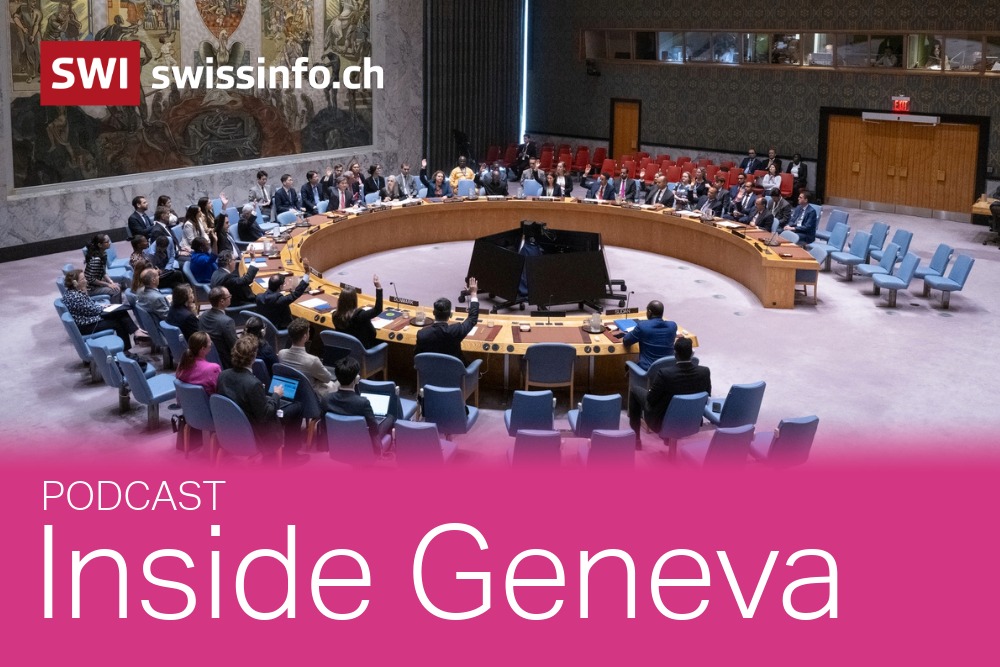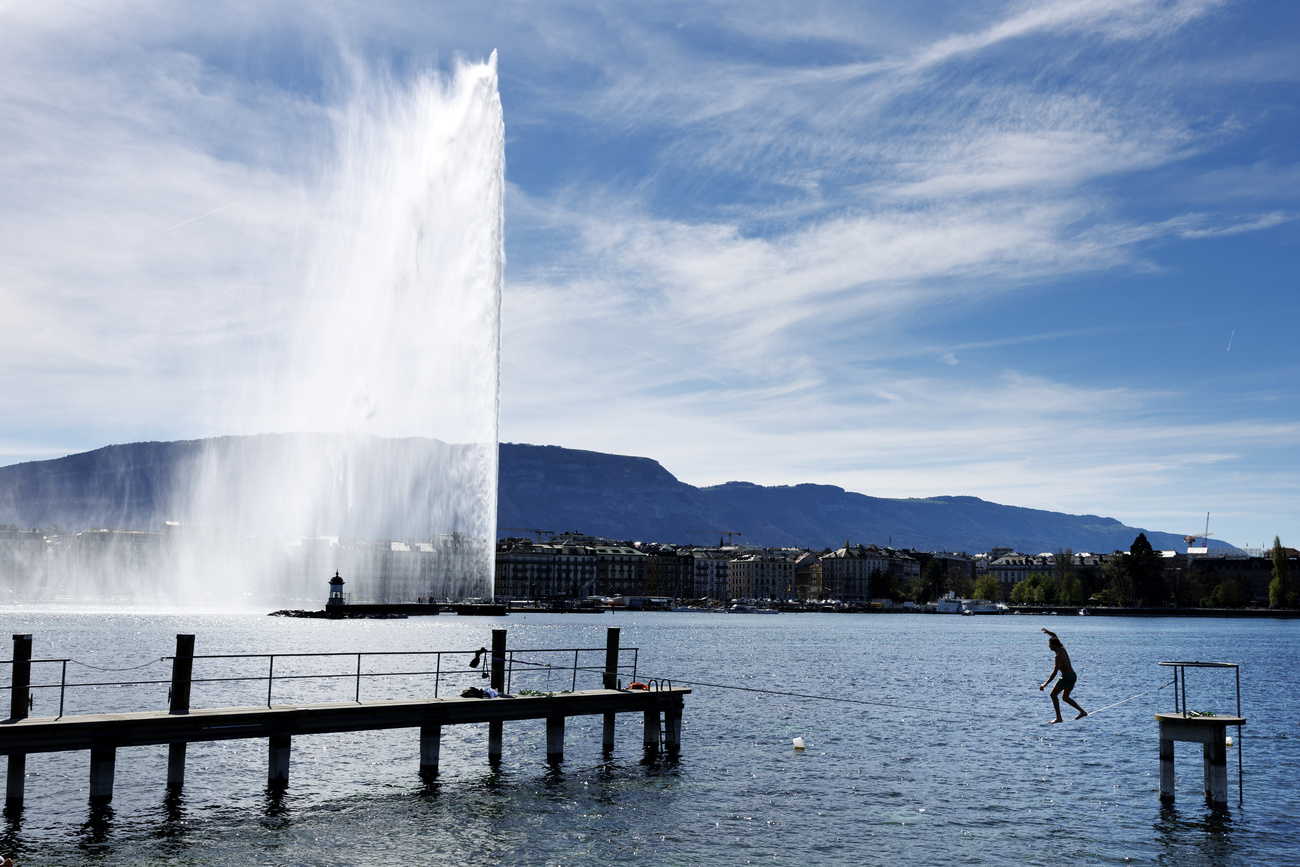
The UN is 80 – but is it still relevant?
Government leaders are heading to New York this week for the annual UN General Assembly.
It is a momentous moment in many ways: the United Nations is marking its 80th year in the midst of crisis, facing the deepest financial cutbacks in years, and by-passed in its traditional conflict resolution role, whether in Ukraine or the Middle East.
So how relevant is the UN these days? That’s the tricky topic we unpick on Inside Geneva this week, with an in-depth interview with Richard Gowan, UN and multilateralism director at the International Crisis Group.
Gowan starts with some positives. “If you are a refugee in Bangladesh, or if you are looking for protection in South Sudan, the UN is imperfect, but it is relevant,” he tells me.
And he adds, those of us lucky enough to live in peace and stability sometimes forget how large the UN’s remit is. ‘‘We do sometimes forget that the UN still has 60,000 peacekeepers around the world. It’s still running enormous humanitarian operations. So the UN is not dead,” he concludes. “But I think the UN is drifting.”

More
Is the UN still relevant at 80?
Domestic worries and UN paralysis
So how to get the UN back on course? Gowan points out that “most countries quite like the multilateral system,” but in today’s turbulent times their priorities are on domestic economic challenges, incoherent US tariff policies, and, if they are European, real concerns over future US commitment to NATO, and to the continent of Europe.
Meanwhile the big challenges that multilateralism was designed to solve are being stymied by the five dinosaurs who still sit, clutching their vetoes, as permanent members of the UN Security Council.
Russia, China, the United States, France and Britain agree on nothing these days, except, it seems, a shared desire to hang on to those vetoes, which they can and do use to obstruct UN policies.
As Gowan notes, the security council has been paralysed for a long time; during the long conflict in Syria it rarely agreed on a meaningful resolution. Now, whether it’s the war in Gaza, or Russia’s invasion of Ukraine, the council appears impotent.
Peacemaker in chief?
An interesting repercussion of that paralysis has been Donald Trump’s grand entry into the field of peace-making. “Donald Trump actually says that he wants the UN to focus back on peace and security”, Gowan points out. “But the reality is that the US and other powers are not working through the UN on any of the big crises of the day.”
Instead, the US president, apparently with his eyes on the Nobel Peace Prize, is engaging in some unilateral peace-making of his own. He has boasted that he has stopped “six wars” (although depending what day it is, sometimes the number is five, and sometimes seven).
Which wars are those? The decades long conflict in the Democratic Republic of Congo, which involves multiple armed groups, as well as Rwanda, apparently. Unfortunately, Amnesty International poured a cold bucket of reality on that claim with a recent report revealing that the violence is continuing.
“Both the Rwanda-backed March 23 Movement (M23) and the Wazalendo, a loose coalition of armed groups backed by the Congolese army, have gang raped women and committed widespread human rights abuses against civilians in the eastern Democratic Republic of Congo (DRC),” Amnesty said, adding that the abuses “violate international humanitarian law and could amount to war crimes.”
The UN views the long conflict in the region as one of the world’s most complex and challenging to resolve. “President Trump likes to present himself as a master dealmaker,” says Gowan, “but what he’s talking about is not constructing lasting peace. It’s about having grabbed the headlines on a couple of occasions.”
Many people with long experience in peace-making are, understandably, watching President Trump’s efforts with a certain amount of skepticism. The “peace” in DRC does not seem to have been achieved, while in the recent flare up between India and Pakistan, where Trump also claimed to be the peacemaker, India has suggested his role was at best minimal.
“What UN mediators and other conflict resolution specialists have learned over the last decades is that peace is a very slow business,” says Gowan. “Anyone can get a summit,” he points out, referring to the headline grabbing meeting between Trump and Putin in Alaska. It’s what comes after the headlines that matters, and so far, that’s not much.
Humanitarian by-pass
Another area where Gowan sees the UN’s traditional role being by-passed is its humanitarian work. Unicef, the World Food Programme, the World Health Organisation, and other bodies like the ICRC (red Cross) and MSF (Médecins sans Frontières), which also operate under the principles of neutrality and impartiality, are the ones we expect to see supporting civilians caught up in conflict.
But in Gaza, Israel has made it clear the traditional UN agencies are not always welcome. Visas for international staff are regularly denied, UN supplies are blocked from entering, aid workers – hundreds of them – have been killed. Israel has even declared the UN secretary general himself persona non grata.
“We are seeing, actually, Israel as a matter of policy trying to deconstruct the UN presence in the conflict,” warns Gowan. “And that is something which could set a very disturbing precedent in many other places.”

More
UN Charter turns 80 – but does it still matter?
But the disastrous performance of the US and Israel backed Gaza Humanitarian Foundation, which was brought in to by-pass the UN may, Gowan, thinks be a salutary warning. Since the end of May, over a thousand people have been killed trying to access food from GHF sites.
“You would hope that other global players will look at the Gaza Humanitarian Foundation, see what a disaster it has been” says Gowan. “And take away the lesson that sometimes the UN, for all its flaws, is actually the best placed actor to provide humanitarian aid to civilian populations.”
So what can the General Assembly celebrate?
So when the world’s leaders gather in New York, what can they celebrate? Gowan believes UN secretary general Antonio Guterres is sure to give a rousing speech, reminding member states of why the UN was created, and why the current global challenges make it more relevant than ever.
But the reality is that Guterres, now in his last 18 months in office, is having to spend most of his time cutting the UN budget in a way that doesn’t destroy the institution altogether. The cuts created by the US withdrawal of funding, and budget reductions from other traditional donors in the UK and Europe, will mean thousands of job losses, possibly mergers of some UN agencies, and across the board cash cuts of 20% and more.
Read more on budget cuts and International Geneva

More
Ripple effect of aid freeze becomes real in Geneva
“He wanted to spend his time rebooting the climate change battle and also getting the UN to focus on issues like regulating artificial intelligence” Gowan reminds us. “And instead, he’s having to spend his twilight in office trying to get the staff to shave off 20 % of posts”.
“It’s a bit of a tragic story really. It’s a reminder that however experienced and however smart a politician may be, events will always shape their time in office. And I think that has very much been the case for Guterres.”
Listen to the whole fascinating conversation on Inside Geneva.
vm

In compliance with the JTI standards
More: SWI swissinfo.ch certified by the Journalism Trust Initiative






























You can find an overview of ongoing debates with our journalists here . Please join us!
If you want to start a conversation about a topic raised in this article or want to report factual errors, email us at english@swissinfo.ch.